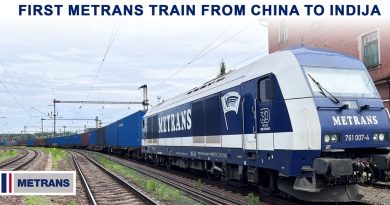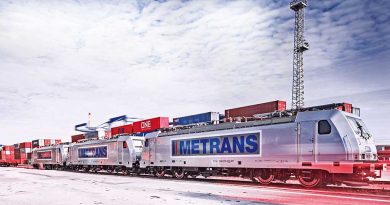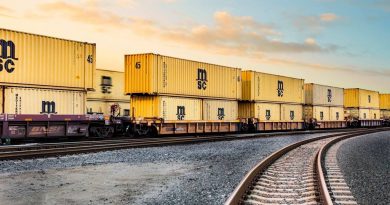Clemens Forst, OBB Rail Cargo Group – There is great potential for us in the Serbian market
“Our perspective in Serbia is to find solutions for small and medium business in wagon group and single wagonload shipments. The current infrastructure and railway reconstruction work reveal that there is great potential for us in the Serbian market,” Clemens Forst, Spokesman of the Board, OBB Rail Cargo Group, said in an interview with the PlutonLogistics portal.
At the very beginning of 2021 – declared the European Year of Rail – in an exclusive interview with representative of one of the leading railway companies in Europe, we stopped looking over our shoulders and turned to the future! Will trains – in not too distant 2030 – truly navigate through Europe as fast as trucks?
The Vienna-based Rail Cargo Group (part of OBB) brings together a team of around 9,300 logistics professionals in 34 countries. They run almost 507,000 trains a year, covering just under 50 million kilometers. With a turnover of €2.3 billion, as well as 150 million net tons of goods transported by their own rail, they represent an important link in the European railway industry.
PL: The passing year has been one of the most challenging years for the transport industry as a whole. What was 2020 like for ÖBB Rail Cargo Group and what business results did you realize?
– At the start of 2020, virtually no one could have anticipated what this year had in store for us. COVID-19 has required strong collaborative efforts and extensive crisis management.
The crisis has reached enormous proportions worldwide – and we are not immune to its impact. In rail freight, we reached a low point around Easter with a slump of around 30%. At the moment, our volumes are again close to pre-COVID levels but do not yet reflect the effects of the current lockdowns all over Europe. Despite this year’s challenges, Rail Cargo Group delivered every tonne of freight even during the corona peak periods and kept the flow of goods moving. In this way, we have once again demonstrated the systemic importance of the rail industry this year and proved that we are one of its key players.
PL: At the same time, it seems that it was a year of innovation for you, as you have shown great commitment to the digital transformation segment. Tell us a little more about it.
– 2020 was also a year full of innovations, new products and, above all, it was a major milestone in our transformation into a digital RCG. As a way to make rail freight more accessible, we have been working hard on digitalizing the Rail Cargo Group since 2017. 2020, was an important milestone in our move into the digital RCG with SmartLINK, our digital service portfolio, and offer customers our first digital services with our digital assistant MIKE.
In the field of innovation, we have been equipping our freight wagons with the state-of-the-art telematics and sensor technology SmartCargo, we have been working on our TransANT wagon innovation, and on driving forward Digital Automatic Coupling (DAC) throughout Europe within the RailFreightForward coalition, and much more.
These innovations lay the foundation for the automation and digitalization of rail freight transport and represent a significant step towards increasing its attractiveness and productivity.
PL: The passing year – 2020 – was marked by numerous significant events for rail freight to and from China. What events would you single out as particularly important for your company?
– Currently, Europe is very well connected to Asia via several intermodal network connections, with increased direct trains specifically from Austria to China being handled in 2020. A future regular direct connection, depending on market developments (especially depending on sea freight prices and capacities), is therefore quite realistic.
In the intermodal area, a whole series of new connections to and from China have been added recently, and each new route extends the overall coverage of our Eurasian network. One example is our new high-speed TransFER across Ukraine from Xi’an to Hungary. Based on our China traffic, we have also been offering an LCL service on the Shanghai-Vienna route with one fixed departure per week since mid-November 2020.
Rail was essential, especially during the pandemic outbreak. We as Rail Cargo Group did our utmost to support local companies in China but also Austrian companies in import and export. This showed that rail is not only a short-term alternative, but a long-term solution for the transport of goods to and from China.
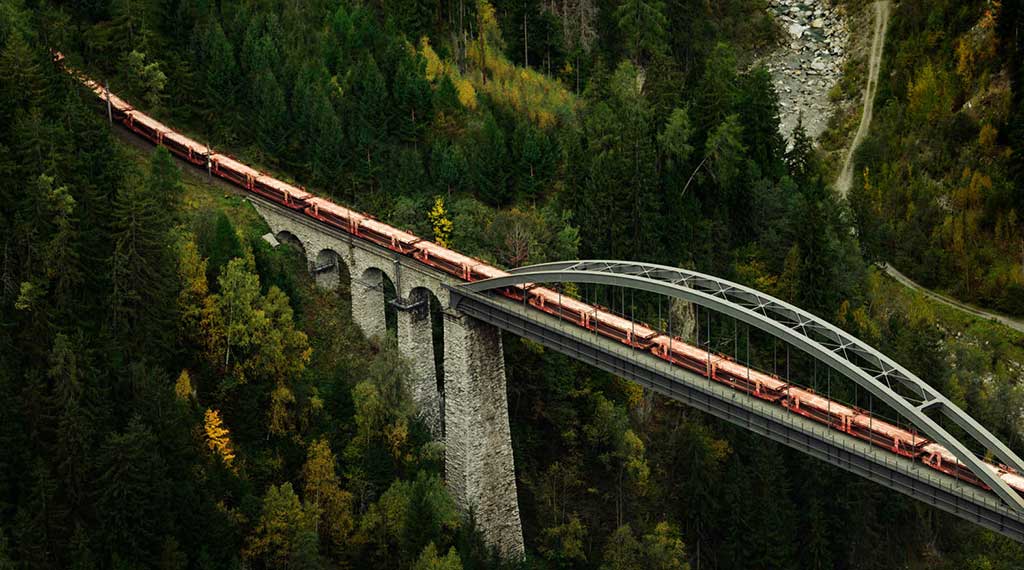
PL: In July, RCG dispatched 2 block trains from Jinan to Belgrade carrying COVID-19 protective goods for the State of Serbia. Tell us more about that project.
– This project shows us that the Asia-Europe rail corridor is getting longer. It’s unusual for block trains to travel directly from Asia to the SEE countries. One interesting aspect of this project is the great level of teamwork involving many of our Group’s subsidiaries who worked closely together and made sure the goods were delivered safe and sound and on schedule. Our logistics group Rail Cargo Logistics, our operator group Rail Cargo Operator, Rail Cargo Hungaria and other partner railway undertakings companies took part in this project.
The trains were transshipped at the Eperjeske station (UA/HU border) to normal gauge wagons owned by RCG. Then, they were immediately delivered to Kelebia-Subotica (HU/SRB border) via the shortest route. Here, the train was handed over to the Serbian railway operator. These two trains were the first to come from Jinan, China, since the period when Chinese container export trains stopped running for a while.
We have been running regular transport services from Jinan to Hungary since this connection was launched. One train runs every second week and in the meantime we have one block train running from Xi’an on a weekly basis.
PL: To what extent and in what way is your company doing business in our country at the moment?
– In Serbia, we as a Group are working in partnership with existing logistics companies, freight forwarding companies and railway undertakings. Currently Serbia Kargo A.d. is our major service partner. Serbia has always been an important country for us due (to) its geographic location! The country is situated on Corridor X, which connects SEE-CE and WE countries.
We are organizing TransFER product to Turkey and Greece through Serbia and send approximately one thousand trains via Serbia each year. Some of them are destined for locations within Serbia and others are in transit through Serbia to neighboring countries such as North Macedonia, Greece, Bulgaria and Turkey.
PL: Although the market for rail freight transport in Serbia is still at an early stage of development, in the last few years (more precisely since the liberalization in 2016 – which is a relatively short period of time), numerous competitors have entered the market. A recently published analysis estimated that there is potential for the entry of new players – the name Rail Cargo Austria was mentioned, among others. Could similar plans be part of your agenda?
– Due to the reason mentioned above, we always check and follow market developments in Serbia. This liberalization opened up the possibility of founding and operating private railway operator companies. Most of these operators focus on one project, or they transport a special kind of goods. RCG as a Group already operates various fields of business as logistic service providers or as on-site RUs in neighboring countries such as Romania, Croatia and Bulgaria. In Serbia, we are looking for a long term strategic partnership, due to the local market conditions and infrastructure. We must point out that the quality and stability of the transport services we provide our customers are our top priority.
PL: In which segment do you see the potential for your company’s business operation in Serbia?
Our perspective in Serbia is to find solutions for small and medium businesses in wagon group and single wagonload shipments. The current infrastructure and railway reconstruction work reveal that there is great potential for us in the Serbian market. We look forward to volume growth in Serbia – both in conventional and intermodal transport.
We want to focus on this region and include other SEE countries, tap into the potential of the Adriatic ports and gateways, to establish connections between mainland CE-WE countries, and develop cooperation opportunities with local customers, partners, acquire new clients and provide them our high-quality expertise and services!
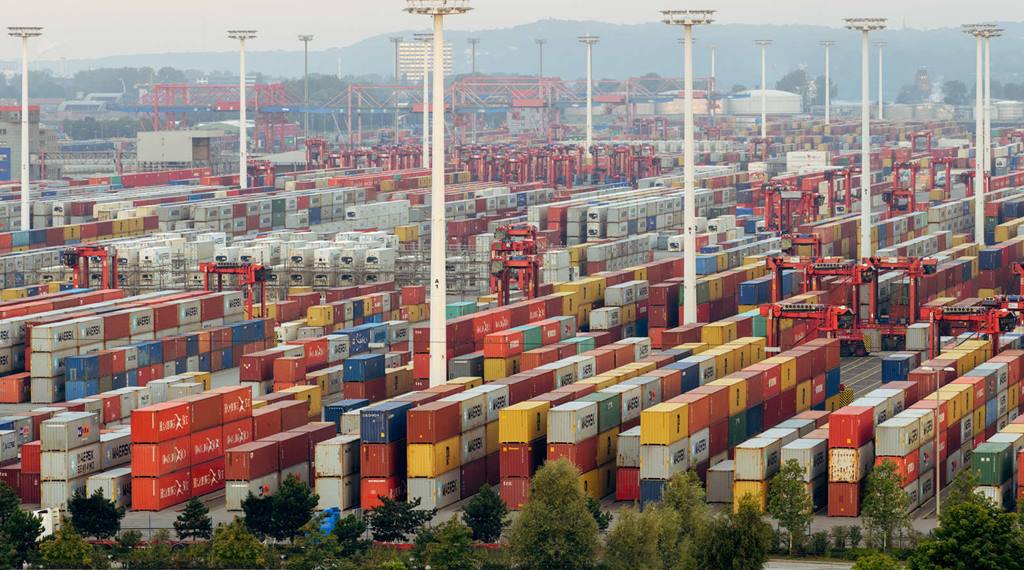
PL: Rail Cargo Group is a leading Rolling Road (RO-LA) service provider in Europe. How much interest did users exhibit for this segment, how many trucks were transported in this way in 2020? What are your plans for RO-LA service?
The ROLA is a short-distance service aiming at easing crossing of the Alps, especially given transit restrictions in Tyrol. It is important to note that it would be preferable if not only the alpine crossing but the whole long-haul could be done on rail but most European countries lack fair competitive boundary conditions for rail. We see the ROLA in terms of protecting the population in the Alpine region from overboarding transit traffic.
As of October 1, 2020, ROLA prices have been reduced. By reducing the base price and offering attractive round-trip discounts, we want to provide our customers with an even more interesting ROLA offer. The new pricing system allows ROLA rides through Tyrol starting at just 82 euros. In this way, we want to take a further step towards shifting freight traffic from road to rail. All ROLA customers, regardless of trip frequency and connection, will benefit significantly from this reduction. In addition, freight forwarders and haulage companies that regularly use the ROLA connections on the Brenner axis can take advantage of a further discount: This is because the round trip discount has been added. This is granted from 8 round trips per calendar month and is paid out from the 1st round trip. The more often ROLA is used, the higher the discount.
A new service offered by ASFINAG (they plan, finance, build, maintain, operate and collect toll for 2,200 kilometres of motorways and expressways in Austria) in cooperation with the ÖBB Rail Cargo Group is also intended to make ROLA even more attractive. On the homepage of ASFINAG, the current ROLA departure times and the current capacity utilization can be viewed directly and the link for direct booking of the ROLA can be called up. Companies only need to click on the desired route on the map and see with one click whether there are still seats available for the environmentally friendly journey through Tyrol. To achieve our climate targets, an effective shift of heavy goods traffic to rail is crucial for success. This can only be achieved if all relevant partners work together in the best possible way. This includes, in particular, close dovetailing between rail and road. This new service is another building block to keep the economy and our country running in challenging times like these
In 2020, Rail Cargo Group transported 151,274 trucks by rail with ROLA, thus making a significant contribution to a clean environment and effective relief for the population along the transit routes. Depending on customer demand, we can increase the corresponding capacities very quickly.
Autonomous train operations, digital capacity management…
PL: There is an increasingly widespread understanding that the railway is the only sustainable mode of land transport. In your opinion, what are the main steps that states and governments should take for the railway to gain a larger market share in Europe in the coming years?
Climate targets cannot be achieved without rail! Europe needs a turnaround in freight transport as well. If the European Commission and the member states really take the European Green Deal seriously, they must act now and push the transport of goods by rail.
We need to shift the growth in European freight traffic to rail, also because it is expected to increase by 30 percent by 2030. That would mean around one million additional trucks per day on European streets if we do not take countermeasures.
In Europe, we can only achieve the mobility turnaround in freight transport by working together. As a founding member of the European Rail Freight Forward initiative, it is our declared goal to realize the increased shift of freight traffic to rail throughout Europe.
In terms of modal share, we in Austria are in Europe in a leading position with almost 30 percent (the EU average is 18 percent). Rail Freight Forward aims to raise the modal share throughout Europe to at least the Austrian level of around 30% by 2030. To achieve these goals, a level playing field and a comprehensive technological modernization of the European rail sector is required. By 2030, we want to work with our European partners to implement the following key technologies in rail freight transport in particular:
– Digital Automatic Coupling will replace manual screw coupling and revolutionize rail freight transport in Europe in two senses. It will dramatically reduce the labor intensity and also provide power and data in the entire freight train, thus creating the prerequisites for intelligent trains and autonomous driving. In addition, the Digital Automatic Coupler will enable longer and heavier trains to get goods from A to B even faster.
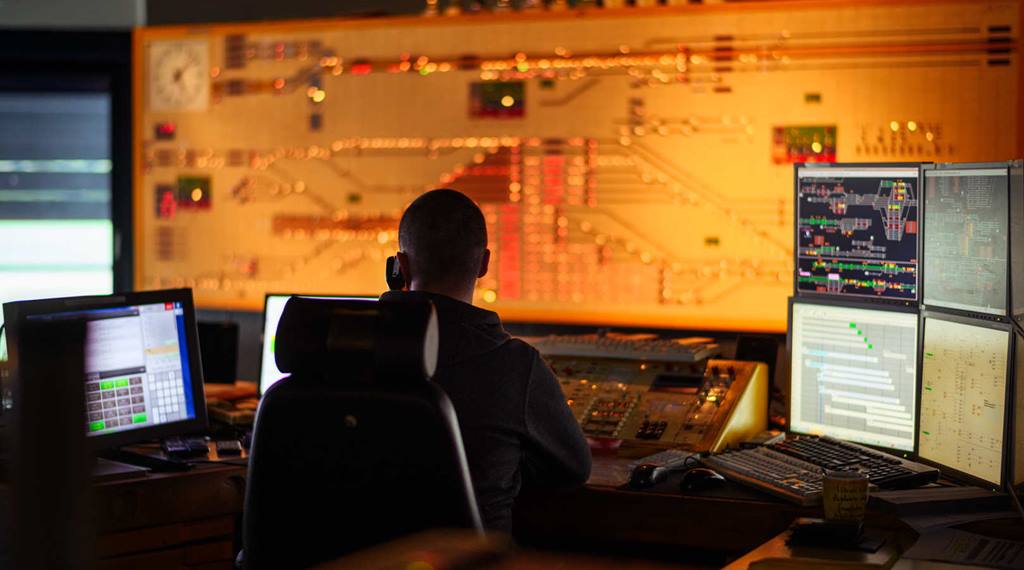
By 2030, we also want to implement the following key technologies in rail freight transport:
– Digital platforms will facilitate data exchange between countries and companies. Seamless international transport of goods will be made possible as a result.
– Digital capacity management to enable standardized and international train path planning and booking. This will significantly speed up the planning process and increase capacity.
Together with our European partners, we want to implement a uniform European train control system. This will make all our traffic much easier. We currently have over 20 different systems!
– And finally, we want to implement autonomous train operations to enable autonomous steering and braking of the train with monitoring in long-distance traffic.
PL: 2021 was also declared the European Year of Rail. What will that mean in practice?
– Rail is the only sustainable land transport mode, now and at least for the next 10 to 15 years. Currently, approximately 10% of all CO2 emissions stem from the transport sector. In order to combat climate change and achieve ambitious goals on European and on national levels, we urgently need to increase transport by rail – as a global laggard in rail modal share, Europe clearly needs a major revolution in freight transport! The Year of Rail is our chance to create more awareness, secure funding and get decisions on a fair transport policy. If the European Commission and the Member States really take the European Green Deal and the Year of Rail seriously – and we think they do – they must act now and create the right conditions for a macroeconomically optimized transport mix, which automatically translates into a much higher modal share of rail.
PL: What will the focus of the Rail Cargo Group be in 2021 and what are the main goals you strive for? What are the main investments that are planned?
– Our vision is to be the “sustainable logistical backbone of the European economy – for a Europe worth living in”. In order to do so, we must first of all be able to invest in our and in the sector‘s future fitness. This is a tough task in economically challenging times where many railway undertakings operate at a loss. We therefore strive to continue reporting positive results in freight transport in order to make necessary investments in the future no matter how much earnings pressure we may feel. Particularly in the field of digitalization and innovation, we are working more and more on transforming the rail system and making rail freight future-fit. MIKE, our digital assistant, already supports many of our customers with the first digital services such as tracking, ordering empty wagons and capacity planning.
More are being added on an ongoing basis. Our goal with MIKE is to digitalize the entire value chain and thus the entire RCG. In 2020, we have invested in innovation: by equipping our fleet of freight wagons with state-of-the-art sensor technology, developing our TransANT wagon innovation, and driving forward Digital Automatic Coupling throughout Europe, we are taking a major step toward automating and digitalizing the industry. In 2021, our ambition is to keep driving innovation forward, steadily expand our network and therefore contribute to achieving the targets of the European Green Deal.
(Author: Milica Milosavljević)
Foto: Clemens Forst – Credit: Gianmaria Gava; Rail Cargo Group – ©RCG/David_Payr



